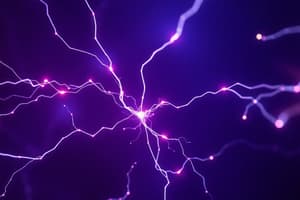Podcast
Questions and Answers
What is the fundamental property of charge?
What is the fundamental property of charge?
- Creation and destruction (correct)
- Mass conservation
- Association with magnetism
- Invariance with distance
Which of the following is true about electric fields?
Which of the following is true about electric fields?
- Electric field lines are directed from negative to positive charges.
- Electric fields are only produced by positive charges.
- The strength of the electric field is proportional to the charge creating it. (correct)
- Electric fields do not exert forces on charges.
What does Coulomb's Law state?
What does Coulomb's Law state?
- Force between charges is directly proportional to the product of their charges. (correct)
- Force between charges is inversely proportional to the distance between them.
- Force between charges is directly proportional to the square of the distance between them.
- Force between charges is inversely proportional to the product of their masses.
What does Gauss's Law relate?
What does Gauss's Law relate?
What is the work done in moving a unit charge from a reference point to a specific point in an electric field called?
What is the work done in moving a unit charge from a reference point to a specific point in an electric field called?
How is capacitance defined?
How is capacitance defined?
Flashcards are hidden until you start studying
Study Notes
Electric Charges and Fields
Physics Class 12 delves into the fundamental concepts of electric charges and their behavior in an electric field. This chapter is crucial for understanding electrostatics and forms the basis of various other topics in the subject.
Electric Charges
- Charge comes in two forms: positive and negative
- Charge is conserved, meaning it cannot be created or destroyed
- Charge is associated with mass, though mass can exist without charge
- The numerical value of an elementary charge is invariant
- Charge produces electric and magnetic fields
Electric Fields
- An electric field is produced by charge
- Electric fields exert forces on charges
- The electric field lines are directed from positive to negative charges
- The strength of the electric field is proportional to the force exerted on a unit charge
Coulomb's Law
- The force of attraction or repulsion between two point charges is directly proportional to the product of their charges and inversely proportional to the square of the distance between them
Electric Potential and Electric Potential Energy
- Electric potential is the work done in moving a unit charge from a reference point to a specific point in an electric field
- Electric potential energy is the energy stored due to the separation of charges
- The electric potential difference between two points is equal to the work done in moving a unit charge from one point to the other
Gauss's Law
- A fundamental law that relates the total electric flux through a closed surface to the enclosed charge
- Gauss's law provides a way to calculate the electric field at any point in space due to a distribution of charges
Electric Field Due to Charge Distributions
- The electric field due to point charges, continuous charge distributions, and electric dipoles is calculated using Gauss's law
- The electric field due to a charged spherical shell and a uniformly charged infinite plane are special cases (often tested in exams)
Torque on a Dipole in an External Field
- The torque experienced by an electric dipole in an electric field is used to derive the electric dipole moment
- This concept is later applied in understanding the behavior of molecules in an electric field
Applications of Gauss's Law
- Gauss's law is used to calculate the electric field in various situations, such as the field due to a uniformly charged disk or a point charge in a medium
- This law enables us to understand the behavior of charges in different media and the presence of dielectrics.
Studying That Suits You
Use AI to generate personalized quizzes and flashcards to suit your learning preferences.




